
-
 New-look Liverpool kick off Premier League season after spending spree
New-look Liverpool kick off Premier League season after spending spree
-
Football and falls as first humanoid robot games launch in China

-
 'Like hell': Indoor heat overwhelms Saudi Arabia's cooks, bakers
'Like hell': Indoor heat overwhelms Saudi Arabia's cooks, bakers
-
On VJ day, king pays tribute to UK veterans, warns of war's 'true cost'
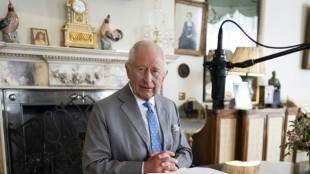
-
 Stocks mostly higher before US-Russia summit
Stocks mostly higher before US-Russia summit
-
Bayern's Bundesliga crown up for grabs after rocky summer

-
 Arsenal face revamped Man Utd as new-look Liverpool open Premier League season
Arsenal face revamped Man Utd as new-look Liverpool open Premier League season
-
South Korea president vows to build 'military trust' with North

-
 'Never again': Indigenous Bolivians sour on socialism
'Never again': Indigenous Bolivians sour on socialism
-
Indonesia's president touts economy, social welfare drive
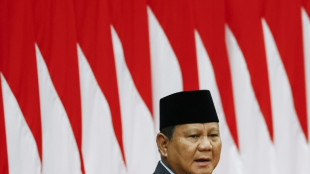
-
 World plastic pollution treaty talks collapse with no deal
World plastic pollution treaty talks collapse with no deal
-
Facing US tariffs, India's Modi vows self-reliance
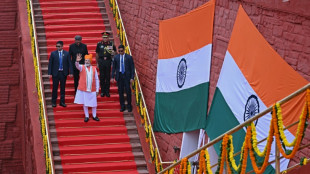
-
 Trump to meet Putin in high-stakes Alaska summit
Trump to meet Putin in high-stakes Alaska summit
-
Indian rescuers scour debris after 60 killed in flood

-
 Ivory Coast village reburies relatives as rising sea engulfs cemetery
Ivory Coast village reburies relatives as rising sea engulfs cemetery
-
Stressed UK teens seek influencers' help for exams success

-
 National Guard deploys 800 personnel for DC mission, says Pentagon
National Guard deploys 800 personnel for DC mission, says Pentagon
-
Japan emperor expresses 'deep remorse' 80 years after WWII

-
 With waters at 32C, Mediterranean tropicalisation shifts into high gear
With waters at 32C, Mediterranean tropicalisation shifts into high gear
-
Historic Swedish church being moved as giant mine casts growing shadow

-
 Malawi's restless youth challenged to vote in September polls
Malawi's restless youth challenged to vote in September polls
-
Indonesian roof tilers flex muscles to keep local industry alive

-
 World's first humanoid robot games begin in China
World's first humanoid robot games begin in China
-
Scott Barrett returns to lead All Blacks against Argentina

-
 Five things to know about Nigeria's oil sector
Five things to know about Nigeria's oil sector
-
New compromise but still no deal at plastic pollution talks
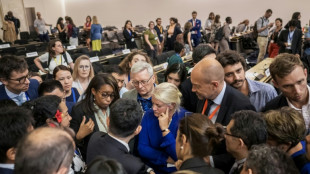
-
 France's Cernousek seizes lead at LPGA Portland Classic
France's Cernousek seizes lead at LPGA Portland Classic
-
Putin-Trump summit: What each side wants

-
 Desperate Myanmar villagers scavenge for food as hunger bites
Desperate Myanmar villagers scavenge for food as hunger bites
-
Qualifier Atmane stuns Rune to set up Sinner semi-final in Cincinnati

-
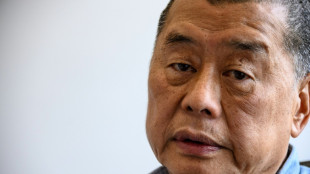 Hong Kong tycoon Jimmy Lai's security trial delayed over health concerns
Hong Kong tycoon Jimmy Lai's security trial delayed over health concerns
-
Asia stocks mixed before US-Russia summit

-
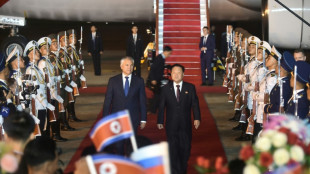 Putin hails North Korean troops as 'heroic' in letter to Kim
Putin hails North Korean troops as 'heroic' in letter to Kim
-
Fleeing the heat, tourists explore Rome at night, underground

-
 Online cockfighting thrives in Philippines despite ban and murders
Online cockfighting thrives in Philippines despite ban and murders
-
Keeping cool with colours -- Vienna museum paints asphalt to fight heat

-
 Raising the bar: Nepal's emerging cocktail culture
Raising the bar: Nepal's emerging cocktail culture
-
El Salvador plans 600 mass trials for suspected gang members
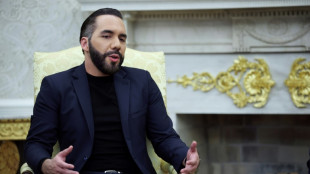
-
 Trump's tariffs drown Brazil's fish industry
Trump's tariffs drown Brazil's fish industry
-
Hong Kong tycoon Jimmy Lai's collusion trial resumes after delay
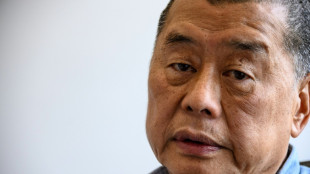
-
 Britain's Princess Anne turns 75 with typically minimal fuss
Britain's Princess Anne turns 75 with typically minimal fuss
-
Japan posts modest growth despite US tariffs

-
 Rugby Championship kicks off amid uncertain future
Rugby Championship kicks off amid uncertain future
-
Israeli far-right minister backs contentious West Bank settlement plan

-
 Hot putter carries MacIntyre to three-shot lead at BMW Championship
Hot putter carries MacIntyre to three-shot lead at BMW Championship
-
'Ridiculous': How Washington residents view the new troops in town

-
 Global plastic pollution treaty talks extended in 'haze' of confusion
Global plastic pollution treaty talks extended in 'haze' of confusion
-
Trump's tariffs have not reduced Panama Canal traffic -- yet

-
 YouTube turns to AI to spot children posing as adults
YouTube turns to AI to spot children posing as adults
-
Sky's the limit for Duplantis ahead of 'super-sick' Tokyo worlds


Hungarian lawmakers back constitutional curbs on LGBTQ people, dual nationals
Hungarian lawmakers on Monday overwhelmingly backed constitutional changes targeting the country's LGBTQ community and dual nationals, the latest step to strengthen longtime nationalist Prime Minister Viktor Orban's self-styled "illiberal" brand of democracy.
Since his return to power in 2010, Hungary's leader has widely restricted the rights of the LGBTQ community, the media, courts and academia. In mid-March, he vowed to undertake an "Easter cleanup" against his domestic opponents he has called "stink bugs".
The constitutional amendment -- which proclaims that people can only be male or female -- echoes moves on gender by Orban's ally US President Donald Trump.
It also allows the "temporary" stripping of citizenship from some dual or multiple nationals, which could target Hungarian-American billionaire George Soros, a regular fixture of populist conspiracy theories.
Ahead of the vote on the amendment -- which passed parliament with 140 votes in favour to 21 against -- a few dozen protesters temporarily blocked an entrance to parliament before police hauled them off.
"When we chained ourselves up during the constitution's first overhaul in 2011, we never thought that 14 years later, we would have to do the same thing," said opposition lawmaker Timea Szabo.
Opposition politicians from the liberal Momentum unfurled a banner to protest the vote in parliament, while hundreds of protesters outside the building chanted "We will not allow ourselves to be transformed into Putin's Russia".
Ruby, a 19-year-old transgender woman, who declined to give her surname, told AFP that she joined the rally to stand up against the government which seeks "to eliminate transgender people" and "hide what they don't like, just as in Russia".
- Raft of changes -
Besides the provision proclaiming that people can only be male or female, another declares that children's rights for their "proper physical, mental and moral development take precedence over all other fundamental rights", except the right to life.
That provision is seen as a way to strengthen the legal foundations for the prohibition of the Pride march.
Another prominent provision empowers the government to temporarily strip Hungarian citizenship from dual or multiple nationals -- even if they acquired their nationalities by birth.
The governing party suggested the move is aimed at "speculators" financing "bogus NGOs, bought politicians and the so-called independent media" from abroad.
A related piece of legislation -- to be voted on at a later date -- specifies that Hungarian citizenship can be suspended for a maximum of 10 years and those affected can be expelled from the country.
Nationals from other EU member states would be exempt, together with a few other countries in Europe, according to the proposal.
Last week, more than 30 prominent Hungarian legal experts castigated the measure as "an unprecedented construction in international law" that could be contrary to binding human rights conventions.
- 'Soft Putinism' -
Critics say the proposed legal changes further erode democratic rights in the central European country, moving the EU member state even closer to the kind of authoritarianism seen under Russia's President Vladimir Putin.
"You could consider this soft Putinism," Szabolcs Pek, chief analyst at the think tank Iranytu Intezet, told AFP.
"People are not falling out of the window, but the government is increasingly limiting the space for opposition politicians, journalists and civil society," he said.
Politically, the measures are seen as an effort to shore up dwindling support for the ruling coalition, divide the opposition along ideological lines, and court the far right ahead of next spring's parliamentary election.
Orban's legislative "boisterousness" is a bid to take back control of the public agenda, according to Pek.
"In this respect, he has been successful, because public discourse is no longer about the failing public services or the weak economy," Pek said.
Since last year, Orban has faced an unprecedented challenge from former government insider-turned-opposition leader Peter Magyar, whose TISZA party has been eroding Fidesz's longtime solid lead, according to opinion polls.
Pek stressed the Pride ban is a "trap" for Magyar: standing up for LGBTQ rights could lose him conservative supporters, but his current silence might drive left-wing and liberal voters to other opposition parties.
J.Saleh--SF-PST
